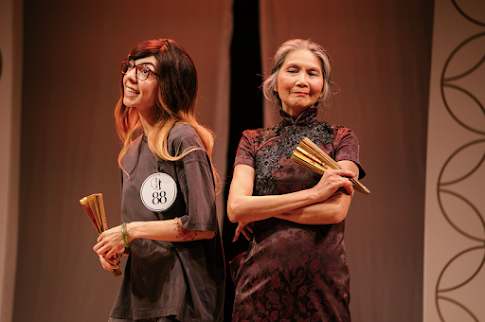The relationship between Lily and her Poh Poh (in the living and the spiritual world) constantly moves from affectionate to exasperating as Stephanie Jack and Gabrielle Chan touchingly display the underlying tension, grief and regrets they feel. Chan is full of personality as Adeline, Lily's Poh Poh. Her matter-of-fact attitude and dishing of barbs is a joy to watch and while her fan dance is brief, it is one of Miss Peony’s most powerful moments due to the emotion that Chan carries in it.
The supporting cast are exceptional in their roles with Mabel Li a standout as Sabrina, the "bogan" contestant. Li ensures that even though Sabrina is over the top, she does not become a caricature or the butt of the joke. Shirong Wu and Deborah Faye Lee as Joy and Marcy present the conflicts their characters face but also find the subtleties of the unique humour they each possess. Sabrina, Joy and Marcy may initially be introduced as stereotypical Chinese, but they quickly develop into people with genuine motivations and aspirations.
Courtney Stewart's direction creates a mix of comedy, drama and even instances of horror. She seamlessly swaps from one genre to another, and often brings all three together at the same time. Set and costume designs by Jonathan Hindmarsh are simple but effective in supporting Stewart's direction and adding many visual delights. The main set piece where all the action takes place resembles a walkway for the competition, but small set pieces cleverly help change the environment to a hospital, a funeral and a restaurant. The costumes are a source of constant surprises, and the work that has gone into the womens' various gowns and dresses for the competition is outstanding.
Law raises discussions about what it means to be Australian and Australian-Chinese but she also looks at the intolerance and divide within Chinese communities on how Chinese someone is. Further conversations between characters and events that occur in the show deal with sexuality, relationships, misogyny, sexual harassment and identity. There's a lot to get through and in doing so there are scenes that feel very rushed. A pivotal plot point involving the sponsor of the Miss Peony contest is resolved within minutes, and a budding romance is revealed, discussed and ended in one scene. Understandably, there are time constraints to consider but these two examples require more attention or need to be reworked.
The show has surtitles running along a screen above the actors, in English, Simplified Chinese and Traditional Chinese. This is a great device to allow for English, Cantonese and Mandarin to be spoken while keeping the audience invested and involved in the story. But there were a number of occasions where the surtitles were lagging behind the dialogue, causing the audience to miss punchlines or emotional impacts, so getting the timing correct on this is critical.
Even with the multiculturalism one finds in Melbourne, it's not often we see Asian stories or Chinese stories or women's stories on stage. Miss Peony gives us all three and so much more. There are plenty of laughs to be had, but Miss Peony serves as a reminder of the moving and important stories that are still not making their way to the stage.
Show Details
Venue: Arts Centre Melbourne, 100 St. Kilda Rd, Southbank
Season: until 20 August | Tues - Fri 7:30pm, Sat 1:30pm and 730pm, Sun 5pm
Duration: 120 minutes (inc 20 minute interval)
Tickets: $69 Full | $59 Concession | $35 Under 30s
Bookings: Arts Centre Melbourne

No comments:
Post a Comment